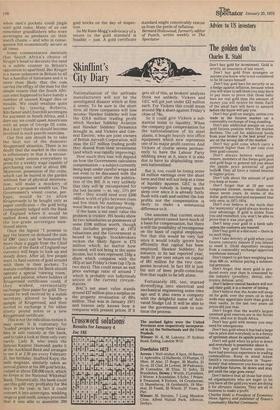Skinflint's City Diary
Nationalisation of the airframe manufacturers will not be the unmitigated disaster which at first it seems. To be sure in the short term all three companies will lose income: Hawker Siddeley will lose the £18.8 million trading profit which Hawker Siddeley Aviation and Hawker Siddeley Dynamics brought in, and Vickers and General Electric, who are joint owners of British Aircraft Corporation, will miss the £17 million trading profit they shared from their investment (and which was rapidly improving).
How much they lose will depend on how the Government calculates compensation — a subject currently being kept under careful wraps and not even to be discussed with the companies until after the publication of the Bill. It is very unlikely that they will by recompensed for the lost income — at, say, 111/2 per cent — they would need over £300 million worth of gilts between them and few think Mr Anthony Wedgwood Benn will be that generous.
if the basis is net asset value the problem is trickier. HS books show its two subsidiaries as possessors of some £106 million worth, though that includes property at 1973 valuations and the Government is bound to haggle. Stockbrokers reckon the likely figure is £75 million which, no matter how invested, will not bring in the same income, but it does represent 155p a share which compares with the 167p at last Friday's close (up 17p in two days). This could mean an exit price earnings ratio of around 7 which is probably not ludicrously unjust in the current circumstances.
BAC's net asset value stands around £37 million plus a surplus on the property revaluation of E61/2 million. That was in January 1971 and heaven only knows how it compares with present prices. If it gets all of this, as brokers' analysts think not unlikely, Vickers and GEC will get just under £22 million each. For Vickers this could mean around 50p a share against Friday's close of 74p.
So it could give Vickers a substantial boost to liquidity. When the company got compensation for the nationalisation of its steel plants, it bought heavily into office equipment which now represents one of its major profit centres. And Vickers of course seems permanently to have the Labour Party nibbling away at it, since it is also due to have its shipbuilding inter_ ests nationalised.
But it, too, could be losing some £4 million earnings over the short term and that will not help at a time of liquidity squeeze. GEC is the company nobody is losing much sleep over since it is already fairly flush with cash and neither the lost profits nor the compensation is likely to make a substantial difference to it.
One assumes that current stock market prices cannot have much of a basis for compensation, but there is still the possibility of recompense on the basis of capital employed. Not that this would be very fair since it would totally ignore how efficiently that capital has been employed. Hawker Siddeley, for instance, in its last reported year, made 31 per cent return on capital of £61 million for the two companies involved. In fact HS is just the sort of keen profit-conscious firm that ought to be left alone.
Fortunately HS, too, started diversifying into electrical and mechanical engineering some time ago and it also owns a company with the delightful name of Activated Sludge Ltd. It will be able to use the government cash to continue the process.


























 Previous page
Previous page